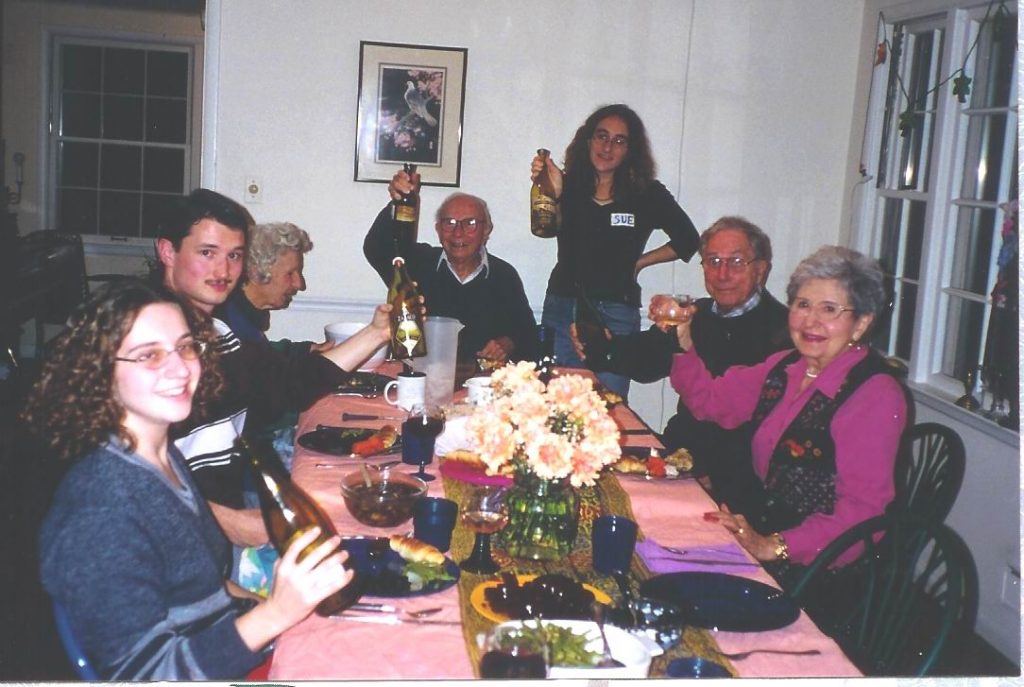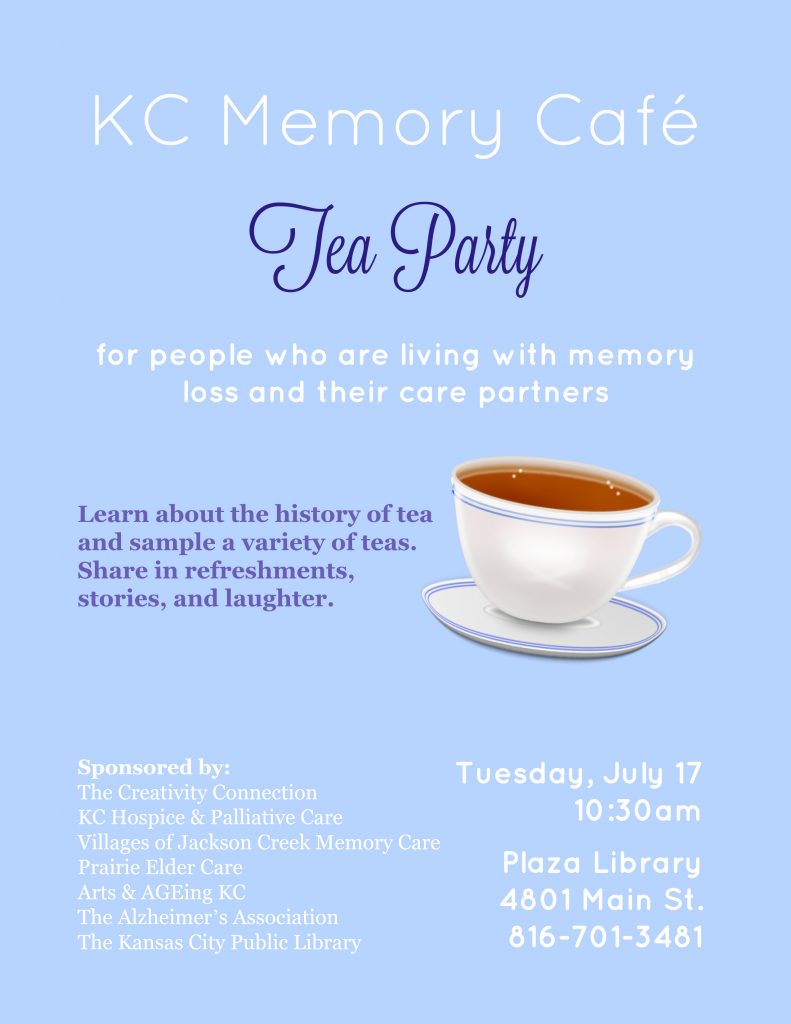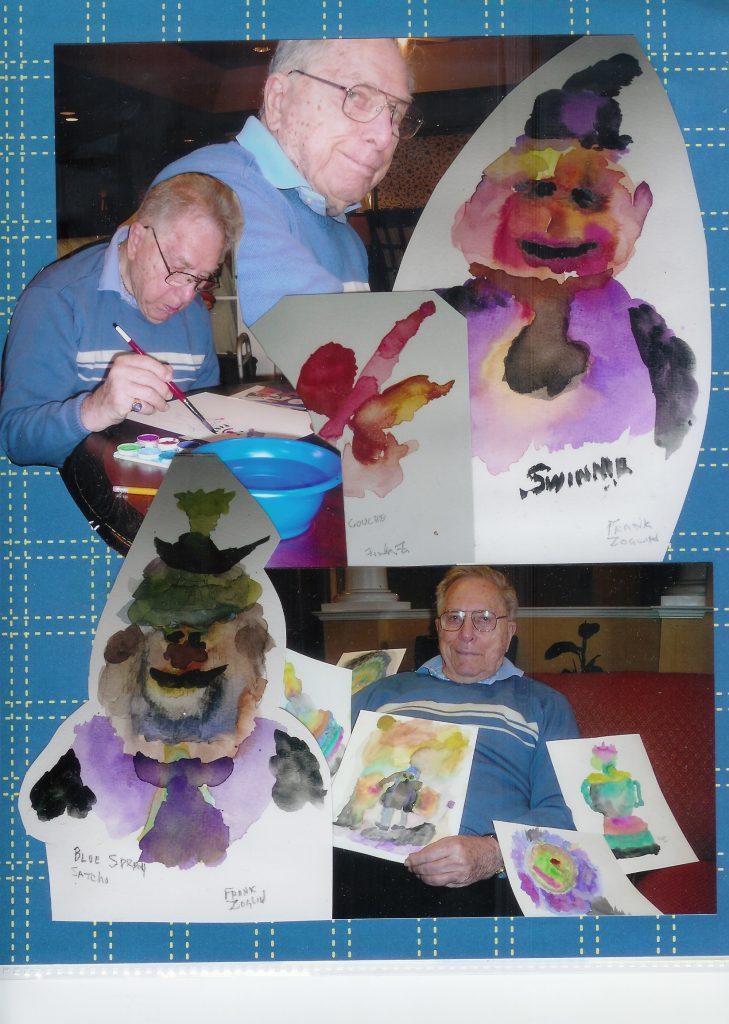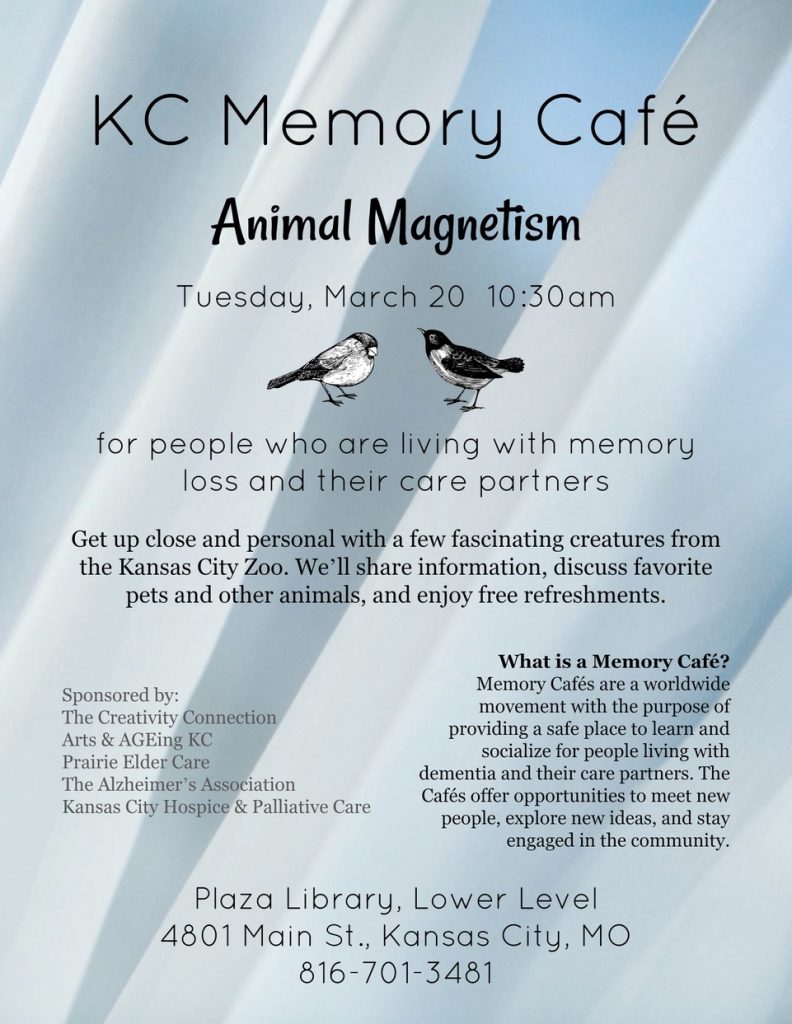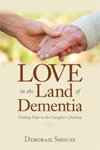Posts Tagged ‘dementia friendly’
Seven Secrets of Dementia Inclusive Holiday Cooking
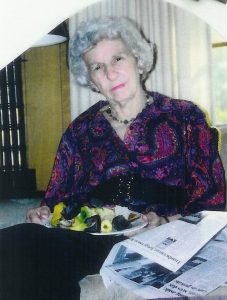 “Who prepared this delicious meal?” a friend asked during a holiday dinner.
“Who prepared this delicious meal?” a friend asked during a holiday dinner.I named my brother Dan, our head chef, first. Then I included the support team—myself, my mom, my daughters and nephews.
“Did I help?” Mom whispered as I passed her the mashed potatoes.
“You sure did,” I told her. ”You mashed the potatoes, put the marshmallows on the sweet potato casserole, and mixed the fruit salad.”
“That’s good,” she said. “I like to help.”
Our desire to help and contribute to seasonal celebrations doesn’t end with a diagnosis of dementia. It’s lovely to linger in the kitchen together, preparing food for the holidays. It’s even lovelier when you can adapt and enjoy dementia inclusive holiday cooking so that people of varying abilities can participate.
Rebecca Katz, author of The Healthy Mind Cookbook, sees food as a great equalizer, something anyone can enjoy regardless of abilities. Fixing a delicacy for someone offers a tangible and delicious way to give back.
Here are six secrets of dementia Inclusive holiday cooking.
- Leaf through a favorite family cookbook or recipe box and use the pictures and recipes as a catalyst for conversation. Ask open-ended questions, such as, ”What does that brownie recipe make you think of?” “What do you like about the holiday season?”
- Chose a time of day when you’re both rested.
- Create a comfortable kitchen environment, by playing familiar seasonal songs you can both hum or sing along to.
- Reduce extraneous noise and distractions, such as a television in the background.
- If you wish, take photos during the experience. That way, you can relive the adventure and share with family and friends.
- Indulge in instant gratification, if possible, by sampling your work when the cooking is complete.
- Even if the person living with dementia can’t help prepare food, he can still enjoy sitting in on the action and the conversation.
Whether you’re stirring a pot of orzo or dropping mint leaves into cool water, enjoy your time of creation and connection in the kitchen.
A longer version of this piece originally appeared on Joan Lunden’s excellent website: Enjoy Dementia Inclusive Holiday Cooking. Thanks to Sue Fitzsimmons, MS, ARNP, Judith Fertig, author of The Memory of Lemon, Kate Pierce, LMSW, Alzheimer’s Association Greater Michigan Chapter, and Rebecca Katz, author of The Healthy Mind Cookbook
Deborah Shouse is the author of Connecting in the Land of Dementia: Creative Activities to Explore Together and Love in the Land of Dementia: Finding Hope in the Caregiver’s Journey.
An Old-Fashioned Holiday
This old-fashioned holiday story from Love in the Land of Dementia: Finding Hope in the Caregiver’s Journey celebrates the spiritual aspects of living with dementia.
When I walk through the doors of the nursing home, I find my mother in her wheelchair, right in front of the medication cart, right behind the central nursing station, where nurses, delivery people, staff and family members congregate. Mom is bent over, her baby doll lying across her lap. When I walk up to her, I ratchet up my energy and widen my smile. I am preparing to clown her into a reaction.
Later my father will ask if I think she recognized me.
“No,” I will have to tell him. “She did not recognize me. But she did smile.”
The smile is important.
My hand waving and head bobbing does its work: Mom does smile, and I can tell she is in her own current version of a good mood.
“Music in the dining room,” the activity board reads, so I wheel her in that direction. An elderly man with a red and white trimmed Santa hat passes us in the hallway.
“Look Mom, there’s Santa,” I tell her.
Having been brought up Jewish, Mom never was all that enthralled with the Claus mythology and she has not changed.
A white-haired woman is in the dining room, busily setting up for the music program. Several patients are already gathered. The woman takes out a microphone, a boom box, an illuminated plastic snowman, and a small silver bell. I continue wheeling Mom down the far corridor, liking the sense of companionship I have from this movement.
As we stroll, a nurse carrying a plate of lettuce walks past us.
“She must have been a good mother,” she says, nodding at the way Mom is holding the baby. “She must still be a good mother.”
“She is,” I say.
I have never really said to my mom, “You were a good mother.”
Now I realize she was.
I can see that Mom is enjoying the ride. She loved movement when she was younger and was far more adventuresome than Dad when it came to airplanes, ski lifts, fast cars, and speedy boats. For her, biting breeze across the face was thrilling, not threatening. Until she became a mother, that is. Then she abandoned her pleasure in the heights and speed and concentrated on making sure we were slow, safe, and centered.
We roll back into the dining room just as the show is ready to start. The singer, Thelda, kicks off her shoes and presses play on the boom box. Above the cheerful sound track, she sings Jingle Bells. She dances across the room with the remnants of ballroom steps. She stops in front of Mom and sings right to her. She gets on her knees, so she can look into Mom’s eyes, and keeps singing. Mom notices her and smiles a little.
Thelda moves on, singing to each of the patients gathered around, so intent on making a connection that she often forgets the words.
“Is it all right for your Mom to come to Christmas holiday events?” the activity director had asked me, when Mom moved from the memory care into the skilled care portion of the nursing home.
“Yes, I’d like her to go to any activities. She likes the extra energy.”
I think Mom would approve of my decision, even though she has never celebrated Christmas. Growing up, her immigrant mother held on to the Jewish spirit of her home, kneading dough for Friday evening challah, observing each holiday and prayer period in her own way. Some orthodox women followed the religious law that commanded a small piece of the dough be burned as an offering to God. My grandmother was poor; she did not believe in burning good food, regardless of tradition. So she sacrificed a portion of the dough to her youngest daughter, my mother Fran. She created a “bread tail,” leftover dough that she smeared with butter and sprinkled with sugar and baked. When Mom used to talk about her mother, she always mentioned this special treat.
Even when I was growing up, and we were the only Jewish family in our neighborhood, my mother still did not sing Christmas songs. She did not willingly go to Christmas parties. She let the holiday rush by her, like a large train, whooshing past, ruffling her hair and leaving her behind.
Now, I am singing Christmas carols to my Mom for the first time. She is smiling, though really not at me. But I am sitting beside her while she is smiling and that makes me happy. She has moved beyond the place where the religions are different, beyond the place where she wants to separate the dough and make a sacrifice for tradition. Her new tradition is anyone who can make her smile.
With each song, from White Christmas, to Silver Bells, to Frosty the Snowman, Thelda moves back to Mom, tapping her, nudging her, shaking a bell almost in her face, acting sillier and sillier. Each time, Mom lifts her head and widens her mouth for a second.
For her finale, Thelda puts on a big red nose and sings Rudolph. When she dances in front of Mom with that nose, Mom laughs. For several minutes, Mom stays fixated on the scarlet nose, her face a miracle in pure enjoyment. I laugh too, so delighted to see Mom engaged and absorbed. Then, Thelda dances away and Mom’s face glazes back over.
Two weeks from now, I will bring a menorah and candles into my mother’s room. My father and I will have a short Chanukah ceremony with Mom. She will pick at the shiny paper covering the Chanukah gelt (chocolate candy disguised as money). She will slump over in her chair. But she will come back to life when she sees me, her only daughter, wearing a big red nose as I light the menorah.
Deborah Shouse is the author of Connecting in the Land of Dementia: Creative Activities to Explore Together and Love in the Land of Dementia: Finding Hope in the Caregiver’s Journey.
A Stirring Tea Party Brings People Together
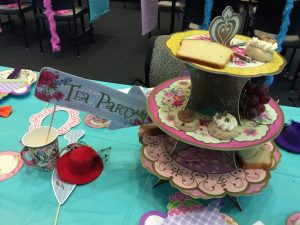 It took us an hour to prepare for our festive tea party and we all enjoyed every moment of it. Jennifer Walker, RN, BSN, Clinical Community Liaison, Kansas City Hospice & Palliative Care, knows how to throw a party. She brought pastel table cloths, a charming complement of paisley-printed cups and plates, along with tiered cookie holders.
It took us an hour to prepare for our festive tea party and we all enjoyed every moment of it. Jennifer Walker, RN, BSN, Clinical Community Liaison, Kansas City Hospice & Palliative Care, knows how to throw a party. She brought pastel table cloths, a charming complement of paisley-printed cups and plates, along with tiered cookie holders.
For the ladies, she offered colorful fascinators (small hats you can clip into your hair) and bright boas. For the men, she had bow ties and top hats. She also brought the ingredients for tea time sandwiches and a variety of cheeses, veggies and meats. Kathi Michaels and Heidi Underwood from Leawood Gardens, and Lainey Berry, from the Law Office of Love & Blomquist, generously provided an array of baked treats, including legendary cookies from McClain’s Bakery and delectable lemon squares.
Our guest speaker, Emilie Jackson from Emilie’s French Teas, shared information about the international history, social rituals, and health benefits that come with sipping a cup of tea. After her talk, everyone set to work creating cucumber and cream cheese sandwiches, with the crusts cut off, of course. We were able to smell several different teas and each person chose a favorite to savor. The food and drink were delicious but even better were the conversations. Each table got into discussions about tea, coffee, life, and more. One guest enjoyed a tete a tete in French with Emilie, who is originally from France. 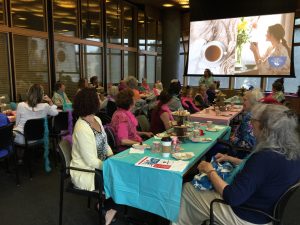
The gathering was so much fun and so engaging, with all the aromas, tastes, and textures, that none of us wanted to leave. It took us even longer to clean up after the stirring tea party, because we had to help eat the leftovers!
Click on this link for the inside story on our tea party: Memory Cafe, Tea Party
Here are a few of our favorite tea quotes:
Where there’s tea there’s hope. Arthur Wing Pinero
If you are cold, tea will warm you; if you are too heated, it will cool you; If you are depressed, it will cheer you; If you are excited, it will calm you. William Ewart Gladstone
I like the pause that tea allows. Waris Ahluwalia
A woman is like a tea bag – you can’t tell how strong she is until you put her in hot water. Eleanor Roosevelt
Please join us for our next cafe when the great Nick Haines brings us the inside story on KC local news. We can’t wait!
Our team, ready for tea
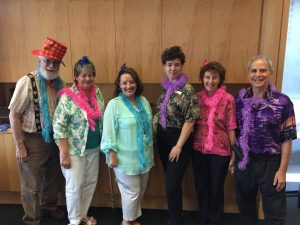
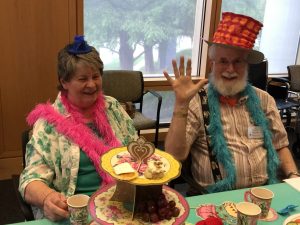
Thanks to our sponsors:
The Kanas City Public Library
The Alzheimer’s Association
The Creativity Connection, Deborah Shouse and Ron Zoglin
Kansas City Hospice and Palliative Care
Arts & Aging KC
KC FilmFest
Prairie Elder Care
The Villages of Jackson Creek Memory Care
Dennis and Carol McCurdy, Community Volunteers
Please email Deborah at myinfo@pobox.com if you need additional information.
And, we hope you can join us for our next events.
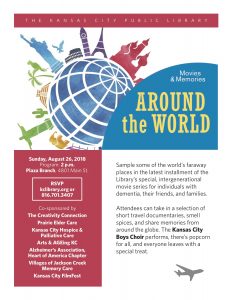
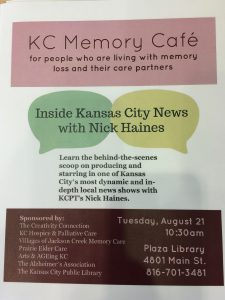
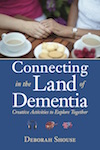
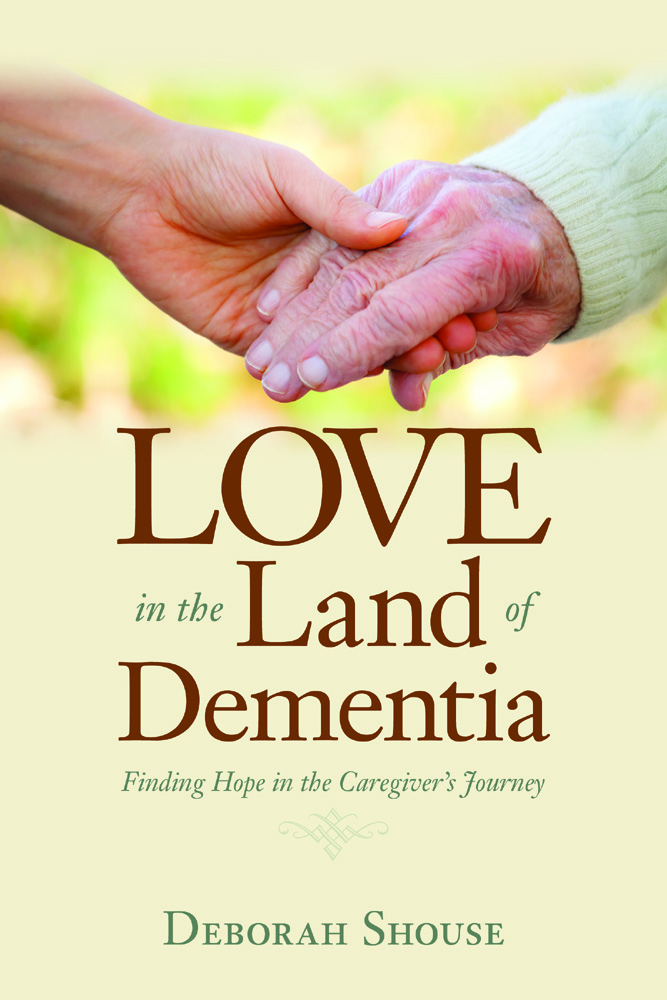
Father’s Day Tips: Four Fabulous Ways to Celebrate When Dad has Dementia
“Dad always liked a big Father’s Day celebration,” my friend told me. “But now he’s deep into dementia; I’m not sure he would notice.” When Ron’s dad Frank relaxed into dementia, Ron and I often struggled with how to approach Father’s Day. Even though Frank didn’t know what day it was, we still wanted to honor Frank as a father. Here are four fabulous ways to celebrate when Dad has dementia.
Reminiscing over Favorite Foods
We brought in a meal created from some of Franks’ current favorites and some gems from the past. Frank’s wife Mollie made her world-famous brownies and legendary rice pilaf. We bought cooked steaks and baked potatoes and as we ate, we talked about meals past. Inspired by the familiar tastes, smells and textures, Frank recited one of this favored old phrases: “I’m cool to other women but I’m hot tamale (Hot to Mollie.)”
Naming His Tunes
Frank and Mollie liked to dance occasionally and for one celebration, we printed out song lyrics and sang Frank and Mollie some of their old favorites. We didn’t sound like Sinatra or Fitzgerald as we warbled “It Had to be You,” or “Stardust” or “Three Coins in the Fountain” but we did sound sincere!
Life Stories
Ron and I created a HERO Project for Frank, a story-scrap book that incorporated highlights and photos from Frank’s life, along with a meaningful storyline. We also created one for Mollie. We read the HERO Projects with Frank and Mollie, using the stories as conversational catalysts. Frank enjoyed the experience; we enjoyed reading aloud with Frank and remembering shared experiences.
Celebrating Special Qualities and Life Lessons
As we sat together, we talked about some of Frank’s many stellar qualities, which included his easy-going nature, his natural charm, his entrepreneurial spirit, and his willingness to try new things. “Did I really do that?” Frank asked, as Ron described the bowling alley Frank and his brother owned and operated. “You did,” Ron said.“That was really something,” Frank said.
Frank’s comment summed up our Father’s Day celebration: it was really something. Just being together was wonderful. And taking time to really celebrate Frank with a tender mixture of food, photos, stories, and conversation was pure magic.
For more ideas on Naming His Tunes, please visit the exciting MusicandMemory.org


The Power of Play in the Dementia Journey
 Josh Rice, a theatre maker and teaching artist, discovered the power of play in the dementia journey when he was still in graduate school. As part of a school project, he partnered with a senior living community on a therapeutic puppetry and improv-based program for people living with dementia.
Josh Rice, a theatre maker and teaching artist, discovered the power of play in the dementia journey when he was still in graduate school. As part of a school project, he partnered with a senior living community on a therapeutic puppetry and improv-based program for people living with dementia.
Together, Josh and the seniors designed and made puppets, and created performances that included songs, personal stories, and comedy. As he worked with the new artists, he noticed people were using their puppets to tell stories. They expressed emotions and they enjoyed the chance to play and have fun. Staff applauded the participants’ short-term memory gains and tactile improvements.
“Plus, we were creating exciting work and performing for people,” Josh says.
Puppetry
One afternoon, a woman who was having a difficult day burst into the puppetry classroom. She was non-verbal but acted out aggressively in a way that could have potentially agitated others. As Josh and the students were rehearsing, she walked in and before she could disrupt the class, Josh made eye contact with her, and gently touched her shoulder. He quietly talked to her and invited her to join in or sit and watch. Within minutes she calmed down.
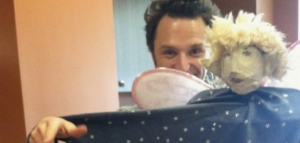 “I put a puppet in her hand and all of a sudden her language came back. It was like a switch had been turned on,” Josh says. This woman filled him with hope and inspired him. “I want people to understand that people who are living with dementia sometimes need us to be patient and keep giving them chances,” he says.
“I put a puppet in her hand and all of a sudden her language came back. It was like a switch had been turned on,” Josh says. This woman filled him with hope and inspired him. “I want people to understand that people who are living with dementia sometimes need us to be patient and keep giving them chances,” he says.
Being in the Moment
Josh knew the potential power of theatrical play and experimented with improv sessions for people living with dementia. The experiment worked.
“For improv, you have to listen and react,” Josh says. “The past or future doesn’t matter; it’s all about the present moment.”
He created a safe, nurturing, and creative atmosphere, offering structured improvisations, and invited his new improv team to play.
“They loved it and it was a thrill to watch them discovering new things and coming up with creative dialogues,” Josh says. “Play is an integral part of our lives and most of us need more of it.”


A Memorable Meeting: KC Memory Cafe
You know what it’s like, creating a program series for the first time. You try to think of everything, knowing that you’ve probably left something out. You hope plenty of people will attend and worry that no one will show up. The weather teases you, threatening snow or rain, thunder or wind. The “what if’s” line up, a mean group of scolders: “What if the elevator breaks? What if the speaker doesn’t show up? What if the snacks don’t arrive? What if the KC Memory Cafe doesn’t work!”
But, as most of us know, worry isn’t really that useful.
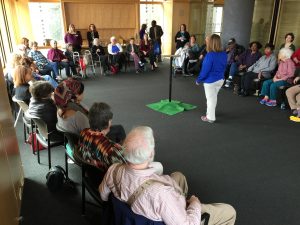 The debut of the KC Memory Cafe was beyond our highest expectations! On March 20, 2018, at 10:30 at the Plaza Library, the educators from the Kansas City Zoo showed up early, riding the elevator down to the lower level with their exotic offerings. The weather was perfect and a lovely group of 40 plus care partners and people living with dementia joined us, delighting in the delicious snacks. And they were even more delighted with the program, all of us laughing at the antics of the cockatoo, leaning forward to see the Vietnamese Tree Frog cozied in his glass aquarium, and petting the chinchilla, with a fluff of fur that felt like a cloud.
The debut of the KC Memory Cafe was beyond our highest expectations! On March 20, 2018, at 10:30 at the Plaza Library, the educators from the Kansas City Zoo showed up early, riding the elevator down to the lower level with their exotic offerings. The weather was perfect and a lovely group of 40 plus care partners and people living with dementia joined us, delighting in the delicious snacks. And they were even more delighted with the program, all of us laughing at the antics of the cockatoo, leaning forward to see the Vietnamese Tree Frog cozied in his glass aquarium, and petting the chinchilla, with a fluff of fur that felt like a cloud.
“I love this animal,” one attendee said, smiling at the blue tongued skink.
“This is the softest fur I’ve ever experienced,” said another, reveling in the chinchilla.
“That bird is so funny,” said another, laughing as the cockatoo bounced up and down, “dancing.”
After learning about the animals, we talked about our own pet memories. It was a wonderful morning and we can’t wait for our next Memory Cafe, on April 17, 2018.
Click here so you can experience the fun of the Cafe.
https://drive.google.com/open? id= 1mU8Iw83lGbhw6FeAVJ3VQ8xhe75qt YYm
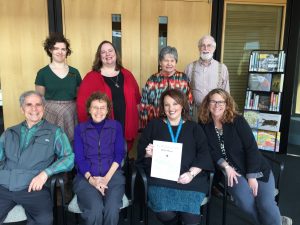 Want to join us on April 17 for our next Cafe? Here’s the scoop!
Want to join us on April 17 for our next Cafe? Here’s the scoop!
Weather Wonders: The Inside Story
Metereologist Karli Ritter Reveals Weather Mysteries 10:30 am on Tuesday, April 17, 2018. Plaza Library Lower Level. Join us for the KC Memory Cafe, a free event dedicated to creating educational and social experiences for people who are living with memory loss and for their care partners.
Our Team — Standing: Emily Cox, April Roy, Carol and Dennis McCurdy. Sitting: Ron Zoglin and Deborah Shouse, Jennifer Walker, Mandy Shoemaker
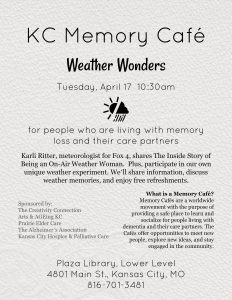


Transferring Skills and Adapting Purpose: Wisdom from Paulan Gordon
As Director of Operations for a national call center, Paulan Gordon’s work required an intense travel schedule, detailed project management skills, and a rigorous adherence to industry standards. So when she started feeling confused, she attributed the struggles to stress. Some days, she felt so overwhelmed that she locked herself in her office and called her husband to come pick her up early.
She was asked to step down from her position. Initially, the loss of her career was both financially and emotionally staggering. Suddenly, she had no purpose, no income, and no peer group. She had to reinvent her life.
In 2012, at the age of 57, Paulan was diagnosed with vascular dementia. After a period of uncertainty, Paulan began using her interpersonal, communication, and management skills and volunteering as a mentor and a dementia advocate.
“I’ve learned there’s a lot more to life than success in business,” she says.
Building Friendships
When she was working, Paulan was so busy she didn’t have time to build friendships. Now, through her mentoring, she has developed deep connections with others who are living with dementia.
“The relationships you create within the walls of dementia are so intimate,” Paulan says. “People talk very openly about their personal problems and challenges. I feel enriched, being part of these conversations and having such close friends.”
Her work as a dementia mentor has also given Paulan a sense of purpose.
“I work with four people and all of them appreciate my phone calls and my caring. That appreciation boosts my spirits,” she says.
Through her mentoring and advocacy work, she’s met doctors, lawyers, teachers, entrepreneurs, and others who have applied their intelligence and skills to living successfully with dementia.
Speaking out for Adaptation
When Paulan gave business speeches, her hands grew clammy and her mouth dry. She battled nervousness and worried about getting facts wrong and making errors.
“Now, I don’t get very nervous,” she says. “I’m speaking from my heart about things close to me, so I can’t make a mistake. Plus, I’m motivated: I want to help others and I want people to understand the truth about dementia.”
Letting Go of Difficulty
“You’ve asked me that question five times already,” Paulan’s husband says.
“Then it must be really important,” she answers.
Paulan is happy she can laugh at trying situations. She has let go of things she can no longer do. She stopped driving because spatial relationships were difficult for her. Paulan knows she’s forgetful and sometimes repeats herself. Her husband and family take that repetition in their stride. She’s also trained her family not to interrupt her when she’s talking, because she can easily lose track of what she was saying.
“My husband doesn’t call attention to my deficits and I forget I have them,” she says.
Proactively, he reminds her about meetings and appointments. She uses a big planner and makes detailed notes, including instructions on how to sign onto the internet, and notes on various conversations.
Changing Reading and Money
Paulan is constantly using her creativity to solve problems. She was an avid reader, but her memory retention has diminished and understanding complicated novels with dozens of characters became a challenge.
“If I put down a book, I can’t remember what happened at the beginning,” she says. “Although there is an upside to the situation: I could save money reading the same books over and over again.”
She temporarily put down her tomes and started reading short stories and magazines. This allowed her to continue her beloved hobby without so much frustration.
She also worked around her reduced mathematical abilities. When she shops, she hands the cashier an extra dollar, so she doesn’t get overwhelmed by counting out coins.
“I hope people are honest when they give me change,” she says.
Stirring up her Spirits
“I don’t worry about dying” she says. “I basically feel positive.”
Many people have a distorted view of dementia. With her speaking and writing, Paulan helps people understand the truths of the disease.
“I like sharing ways to support friends and loved ones who are living with dementia,” she says. “This information helps prevent decline and dramatically increases the well being of both care partners and people living with dementia.”
Meanwhile, Paulan’s advocacy and mentoring work has filled her life with depth, friendships, creativity, and purpose.


A Winning Combination: Children, Exercise, and Music
An orderly group of five-year-olds walk into the dining room at Vernon Manor in Viroqua, Wisconsin. The residents are waiting for them. Each child goes up to an elder and introduces him or her self. Then Ingrid Constalie, AD-BC, CDP, Board Certified Activity Director and Certified Dementia Practitioner, talks to the assemblage about the importance of staying fit. The residents nod sagely: many of them are in their eighties and nineties and they exercise every day. But the days that the kindergartners join them are the best, a winning combination or children, exercise, and music.
The residents love teaching the kids the alphabetic movements to the iconic YMCA song. And the kids are a burst of giggles and wiggles as they fold their arms into wings, strut around, and teach everyone The Chicken Dance.
Ingrid’s focus is creating moments of joy, engagement, and connection.
Her intergenerational activities spark the residents and reduce the stigmas of aging and dementia by educating and informing local children, teens, their teachers, and other members of the community.
“This dancing and exercise exchange is simple, energizing, and very successful,” Ingrid says.
Sing-O at Bingo
Music Bingo offers middle schoolers a chance to work with Ingrid’s elders.
“This is about creating a good experience for your partners,” Ingrid coaches the children in advance. “You are their connection to the world.”
Ingrid plays an opening melody, using songs such as “Happy Trails,” “You Are My Sunshine,” and “Singing In the Rain.” Those who know the title shout it out. Often, partners confer with each other. The children help locate the song title on the bingo card and place a poker chip on each answer. Even people living with advanced dementia enjoy listening to music and being around the children.
Most of the time, the school children are chatty and at ease. But one girl was scared coming into the care community.
“I paired her with Helen, a woman deep into dementia,” Ingrid says. “Within minute, Helen had her arm around the girl and they were both laughing.”
Even children who act up at school are wonderfully behaved during the Bingo experience.
Creating Comparisons and Compassion
Recently, Ingrid orchestrated a project with a high school English class. They interviewed residents and did a comparison and a contrast. For example: “While Clara is getting out of bed with the assistance of staff, I am getting ready for school. While she wheels herself down a long hallway to a dining room, I am eating toast with my sister.”
The teenage journalists asked simple questions, like “What is your morning like?” “How do you spend your afternoon?” “How do you like to dress?”
The students wrote up the results and made booklets. One family was so inspired by the insights in the booklet, they later read parts of it at the woman’s funeral.
Ingrid’s intergenerational connections explore understanding, create empathy, and help create exciting new relationships.


Let’s Go to the Movies: A Dementia-Friendly Series
“Let’s go to the movies,” my dad often said to my mom. My parents would have loved our Movies and Memories series, now starting its second year. We are excited to announce our partnership with the Kansas City Boys Choir and the Kansas City Girls Choir this season. Some of their outstanding performers will be joining us at each event.
Already, the series is making a difference in a variety of ways. Additional libraries in Missouri and other states are interested in implementing the program. And our library is so committed to becoming more dementia-friendly that it is having special training for its staff, courtesy of the Alzheimer’s Association — Heart of America Chapter. Please share this invitation with those who would enjoy it. And if you’re in the Kansas City area, please join us. It’s free and open to all. Let’s go to this movie series!
Dementia Journey: Planting Seeds and Growing Engagement
I met so many inspiring people when I was writing Connecting in the Land of Dementia. Activities director Lori Condict, from Chestnut Glen Assisted Living by Americare in St. Peters, Missouri, created an inspiring program focused on planting seeds and growing engagement. Whether you’re a family care partner or you work in a facility, you’ll learn from Lori’s project.
Planting Seeds and Growing Engagement
“Mable, I could use your assistance this morning,” Lori Condict says. “The tomatoes are ripe and I need help picking them. Are you available?”
Mable nods. Lori waits while Mable puts on her gardening hat and gloves. Then they join others from the memory care community outside in the garden.
“What are you thinking about Mable?” Lori asks, handing her a small bucket.
“My first bite of summer tomato.”
“Let’s try one of these,” Lori says. She knows that Mable and her husband used to have a vast vegetable and flower plot.
Mable plucks a cherry tomato off the vine and pops it into her mouth. Slowly, she picks another and plops it in her bucket. Others in her community are also harvesting the tomatoes.
“We’ll be sharing our vegetables with the food bank, so others less fortunate will enjoy this fresh produce, “Lori reminds her.
“That’s good,” Mable says. “Everyone needs to taste these tomatoes.”
Mable lives in the memory care unit in Chestnut Glen Assisted Living by Americare in St. Peters, Missouri. She is one of the 15 residents working on the Operation Riverfront gardening project. Lori, the activities director in the care facility, is a city girl. But she knew she’d have plenty of help from her residents. She also knew that they would thrive knowing they had a purpose and were giving back to their community.
Seeding Empowerment
Lori started simply, with a bunch of tomato, cucumber, squash, peppers, and pea seeds, pretty and colorful vegetables that would remind residents of their home gardens. Lori had tasks for all abilities: some held little containers while another filled them with dirt; some tamped in the seeds and others labeled them. Lori provided everyone with special hats and gloves.
While they worked, they reminisced, talking about favorite tomato dishes and summertime activities.
Sharing the Bounty
When it was time to share with the local food pantry, the residents did the harvesting and packing.
“We had planters, pickers, packers, counters, and a watering crew,” Lori says. “People who’d been depressed and disengaged got involved. Through working on the project, they felt alive and useful; they had a purpose.”
Want to grow plants, connections, and a sense of purpose? Here are some tips:
- Select flowers, plants, vegetables, and herbs that are pretty, colorful, easy to grow, and have some meaning to the person living with dementia.
- Create small tasks that are interesting and pleasurable.
- To increase the sense of purpose, find ways to share blooms, cuttings, vegetables, and herbs with family, friends, and community members.
- For those who can’t go outdoors, bring the plants to them in containers.
- Infuse the work with opportunities for conversation.
Deborah Shouse is the author of Connecting in the Land of Dementia: Creative Activities to Explore Together and Love in the Land of Dementia: Finding Hope in the Caregiver’s Journey.
